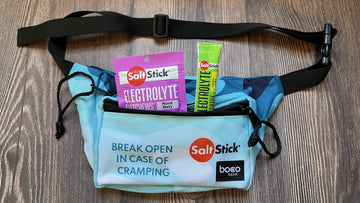
Many physiological processes depend on certain electrolytes, including sodium, potassium, calcium and magnesium. In this blog post, we delve into the importance of potassium to exercise performance.
While there is some debate about the importance of potassium to athletes, many studies have shown that it is beneficial to replace lost potassium during the course of exercise. Otherwise, performance will decline. This is due to the role potassium plays in things like nerve functioning, glycogen processing and fluid regulation.
If you have ever wondered “why potassium,” this blog post is for you.
What is potassium?
Potassium is a salt the body uses to help manage several processes, including sweat, nerve functioning, glycogen and fluid management, and blood pressure.
Nerve functioning: Potassium -- when broken down into the bloodstream -- is an electrolyte, meaning it contains an electric charge. This aspect of potassium helps polarize cells, which is essential to conduct nerve signals, as these signals are electrical impulses sent through the body.
Glycogen and fluid management: Another key function of potassium is fluid management in the bloodstream and cells. Both sodium and potassium levels contribute to blood pressure, and the process of balancing fluid throughout the body is depended on having the right ratio of each electrolyte. Potassium, which is primarily intracellular, works with sodium, which is primarily extracellular, to move water, glycogen and waste products through the cell walls.
Blood pressure: It is important to get the ratio of sodium and potassium correct to achieve a healthy blood pressure level.
Many people mistakenly assume that they have to consume low amounts of sodium in order to reduce blood pressure. In fact, an equally successful solution is to consume higher amounts of potassium. A 1997 study by the
National Heart, Lung and Blood Institute found that volunteers who consumed 4,700 mg of potassium per day through a well-balanced diet that included lots of fruits and vegetables reduced their blood pressure in just two weeks.
What happens to potassium during exercise?
During exercise, potassium plays two critical roles in the form of sweat and the processing of glycogen.
Sweating: When you sweat, you lose several electrolytes, including sodium, potassium, magnesium and calcium. Notably, potassium concentration in sweat is higher in hot environments even for individuals who are heat-acclimatized, according to
research conducted in the 1970s. “The potassium depletion in sweat, even in acclimatized
, is heavy and is likely to play an important role in the causation of heat-illness,” the research concludes. Intensity also affects sweat rates: A study published in 2016 found that potassium losses in sweat increased along with exercise intensity.
In order to keep physical performance output at a maximum, it is important to replenish this lost potassium during exercise, especially if the time spent exercising is three hours or more (such as in a marathon or long bike ride), or sooner if in a hot environment.
Glycogen breakdown: Potassium is also essential to the process of breaking down glycogen in the muscle cells, which helps fuel these cells as they contract repeatedly during endurance exercise. As glycogen is broken down, the muscle cells are depleted of potassium as it flows into the bloodstream before leaving the body through urination or sweat.
Potassium blood concentration: There is some debate in the exercise community on the importance of measuring the concentration of potassium ions in the bloodstream. As discussed above, when cells break down glycogen, they release potassium into the blood. A few studies of athletes have found that during the course of exercise, blood concentration of potassium does not change much. This has led to an incorrect conclusion that potassium levels in the body do not change much.
Instead, after potassium is released into the bloodstream, it is secreted through sweat or urination, which keeps blood levels consistent. Potassium lost through these methods is replaced by potassium secreted from the muscle cells -- at the detriment of the muscle cells. In other words, the bloodstream is just a step in the process, and potassium levels in the blood do not correlate with potassium levels in the muscle cells.
This process of depleting muscle cells of potassium is detrimental to exercise performance over time. As potassium concentration in the cells lowers, there is less available potassium to help with things like blood pressure or nerve functioning. This can dramatically affect performance if not counteracted. Studies of marathon runners (1970, Journal of Applied Physiology) have found that long exercise results in greater amounts of potassium outside the cells, which can contribute to cramping, bloating and general fatigue.
Potassium deficiency symptoms are nausea, slower reflexes, vomiting, muscle weakness, muscle spasms, cramping, and rapid heart rate.
Where does potassium come from?
Potassium is abundant in fruits and vegetables, meaning that for the ordinary person, a healthy diet should be sufficient to obtain the daily requirement for potassium intake. Athlete-friendly foods particularly high in this mineral include bananas, sweet potatoes, berries and watermelon. (A while back, we published a list of recipes that contain high amounts of potassium. Check them out, if you’re struggling to add these foods into your diet.)
Should you supplement potassium?
For athletes exercising in the heat, exercising at high intensities, or exercising for long durations, potassium supplementation may be necessary. This is for all the reasons listed above, namely that potassium is crucial for glycogen processing, and without an adequate plan to replace lost electrolytes, performance will be reduced.
If you are deciding among supplements, feel free to use our product comparison chart below. Remember, it is the ratio of electrolytes that is more important than the exact amount of electrolytes consumed. As you can see SaltStick is the only product that formulated to closely resemble the electrolyte profile lost during activity: sodium, potassium, calcium and magnesium -- all in a form your body can easily absorb.
Can you get too much potassium?
Before discussing the concept of “too much” of any one mineral, it is important to remember that endurance athletes are not typical in their nutrient needs. The average person is not completing one to several hours of exercise per day. While the USDA recommends adults consume 2,300 mg of sodium and 4,700 mg of potassium, standard nutrition advice does not apply to endurance athletes who run through copious amounts of calories and salts during training.
That said, it is possible to over consume potassium (or, as we discussed above, under consume sodium, as it is the ratio of these minerals that matters). Athletes should never take potassium supplements in large doses (beyond normal supplementation) without the advice of a physician.
What does this mean for an athlete?
There are a few key points to keep in mind:
- Athletes need potassium for a variety of performance-related functions, namely the sweating process and the process of breaking down glycogen for energy.
- In a normal day, adults can get adequate amounts of potassium from a diet that includes plenty of fruits and vegetables.
- During the course of long periods of exercise, athletes should ensure they are replacing potassium to help maintain performance. Supplementation can assist in this process.
If you want to learn more about potassium and how it is incorporated into SaltStick products, you can view our “Why Potassium” page here.
Disclaimer: Contact your physician before starting any exercise program or if you are taking any medication. Individuals with high blood pressure should also consult their physician prior to taking an electrolyte supplement. Overdose of electrolytes is possible, with symptoms such as vomiting and feeling ill, and care should be taken not to overdose on any electrolyte supplement.

 Many physiological processes depend on certain electrolytes, including sodium, potassium, calcium and magnesium. In this blog post, we delve into the importance of potassium to exercise performance.
While there is some debate about the importance of potassium to athletes, many studies have shown that it is beneficial to replace lost potassium during the course of exercise. Otherwise, performance will decline. This is due to the role potassium plays in things like nerve functioning, glycogen processing and fluid regulation.
If you have ever wondered “why potassium,” this blog post is for you.
Many physiological processes depend on certain electrolytes, including sodium, potassium, calcium and magnesium. In this blog post, we delve into the importance of potassium to exercise performance.
While there is some debate about the importance of potassium to athletes, many studies have shown that it is beneficial to replace lost potassium during the course of exercise. Otherwise, performance will decline. This is due to the role potassium plays in things like nerve functioning, glycogen processing and fluid regulation.
If you have ever wondered “why potassium,” this blog post is for you.








